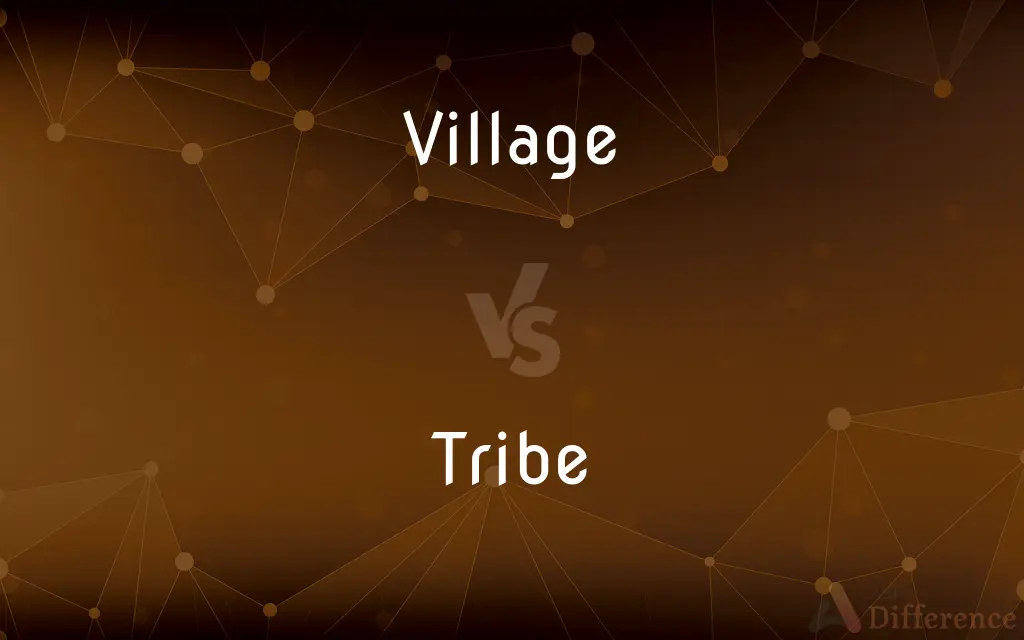Village vs. Tribe — What's the Difference?
By Urooj Arif & Maham Liaqat — Updated on May 4, 2024
A village is a small, settled community often in a rural area, whereas a tribe is a group of people united by common ancestry, customs, and traditions.

Difference Between Village and Tribe
Table of Contents
ADVERTISEMENT
Key Differences
A village is a geographic area where people live in close proximity, typically characterized by homes, farms, and public places. On the other hand, a tribe represents a social organization, not limited by physical boundaries, but defined by social and familial ties.
In terms of governance, villages are often administered by local authorities or municipal governments, whereas tribes are usually governed by traditional leaders or councils, reflecting their cultural and ancestral heritage.
Economically, villagers might engage in agriculture, small-scale trade, or local crafts. In contrast, tribal economies are often based on communal resources, and economic roles can be closely tied to traditional customs and practices.
Cultural identity in a village is generally tied to its locale, with traditions that may vary widely even within small regions. Tribes, however, maintain a distinct cultural identity that spans across wherever its members are located, rooted in a shared lineage and customs.
Social structures in villages are usually diverse and can include various family types and social classes, while tribal societies typically have more defined roles and statuses determined by their age-old customs and tribal affiliations.
ADVERTISEMENT
Comparison Chart
Definition
A small residential community in a rural area.
A group of people connected by kinship and culture.
Governance
Local municipal authorities or village councils.
Traditional leaders or tribal councils.
Economic System
Agriculture, trade, local crafts.
Communal resources, traditional roles.
Cultural Identity
Tied to local customs and regional traditions.
Strong, unified identity based on ancestry.
Social Structure
Diverse family structures, varying social classes.
Defined roles, strong communal ties.
Compare with Definitions
Village
Administrative divisions within cities in some countries.
Each village in the city elects its own council.
Tribe
Informal: A large family or a group of people who share common characteristics or interests.
A tribe of artists living in the city's west end.
Village
In gaming and fictional contexts, a small settlement that adventurers may visit.
The game’s tutorial starts in a small village.
Tribe
A social division in a traditional society consisting of families linked by social, economic, religious, or blood ties.
The tribe gathers annually to celebrate their shared heritage.
Village
A cluster of dwelling houses in tribal societies, sometimes semi-nomadic.
The village moves locations depending on the season.
Tribe
In anthropology, a level of human social organization more complex than a band but less structured than a state.
Anthropologists study how tribes form social bonds and maintain community life.
Village
A small community or group of houses in a rural area, larger than a hamlet but smaller than a town.
The village had only one main street but was famous for its annual fair.
Tribe
A group of people who share a common culture and dialect, typically having a recognized leader.
The tribe's chief is responsible for mediating conflicts.
Village
A self-contained district or community within a town or a city, perceived as a smaller, distinct area.
Greenwich Village is known for its bohemian arts scene.
Tribe
The term tribe is used in many different contexts to refer to a category of human social group. The predominant usage of the term is in the discipline of anthropology.
Village
A village is a clustered human settlement or community, larger than a hamlet but smaller than a town (although the word is often used to describe both hamlets and smaller towns), with a population typically ranging from a few hundred to a few thousand. Though villages are often located in rural areas, the term urban village is also applied to certain urban neighborhoods.
Tribe
A unit of sociopolitical organization consisting of a number of families, clans, or other groups who share a common ancestry and culture and among whom leadership is typically neither formalized nor permanent.
Village
A small group of dwellings in a rural area, usually ranking in size between a hamlet and a town.
Tribe
Any of the three divisions of the ancient Romans, namely, the Latin, Sabine, and Etruscan.
Village
In some US states, an incorporated community smaller in population than a town.
Tribe
Any of the 12 divisions of ancient Israel.
Village
The inhabitants of a village; villagers.
Tribe
A phyle of ancient Greece.
Village
A dense group of animal habitations
A prairie dog village.
Tribe
A group of people sharing an occupation, interest, or habit
A tribe of graduate students.
Village
A rural habitation of size between a hamlet and a town.
There are 2 churches and 3 shops in our village.
Tribe
(Informal) A large family.
Village
(British) A rural habitation that has a church, but no market.
Tribe
(Biology) A taxonomic category ranking below a family or subfamily and above a genus and usually containing several genera.
Village
(Australia) A planned community such as a retirement community or shopping district.
Tribe
An ethnic group larger than a band or clan (and which may contain clans) but smaller than a nation (and which in turn may be contained within a nation). The tribe is often the basis of ethnic identity.
Village
(Philippines) A gated community.
Tribe
(synecdoche) A tribal nation or people.
Village
A small assemblage of houses in the country, less than a town or city.
Tribe
(pejorative) A nation or people in an area considered culturally primitive, such as Africa, Australia or Native America.
Village
A community of people smaller than a town
Tribe
A socially cohesive group of people within a society
Village
A settlement smaller than a town
Tribe
(zoology) A group of apes who live and work together.
Village
A mainly residential district of Manhattan; `the Village' became a home for many writers and artists in the 20th century
Tribe
(taxonomy) A hierarchal rank between family and genus.
Tribe
The collective noun for various animals.
Tribe
(stock breeding) A family of animals descended from some particular female progenitor, through the female line.
The Duchess tribe of shorthorns
Tribe
(transitive) To distribute into tribes or classes; to categorize.
Tribe
A family, race, or series of generations, descending from the same progenitor, and kept distinct, as in the case of the twelve tribes of Israel, descended from the twelve sons of Jacob.
A wealthy Hebrew of my tribe.
Tribe
A number of species or genera having certain structural characteristics in common; as, a tribe of plants; a tribe of animals.
Tribe
A nation of savages or uncivilized people; a body of rude people united under one leader or government; as, the tribes of the Six Nations; the Seneca tribe.
Tribe
A division, class, or distinct portion of a people, from whatever cause that distinction may have originated; as, the city of Athens was divided into ten tribes.
Tribe
A family of animals descended from some particular female progenitor, through the female line; as, the Duchess tribe of shorthorns.
Tribe
To distribute into tribes or classes.
Our fowl, fish, and quadruped are well tribed.
Tribe
A social division of (usually preliterate) people
Tribe
A federation (as of American Indians)
Tribe
(biology) a taxonomic category between a genus and a subfamily
Common Curiosities
Are all tribes based on kinship?
While many tribes are based on kinship, some can also be structured around shared cultural practices or geographic locations.
Do tribes have legal recognition?
In many countries, tribes have legal recognition and certain rights that pertain to self-governance and territory.
What types of economies are typically found in villages?
Villages often rely on agriculture, local crafts, and small businesses as economic foundations.
Can villages exist within urban areas?
Yes, villages can exist as distinct communities within urban areas, often retaining a unique identity and culture.
What roles do elders play in villages and tribes?
In villages, elders may hold informal respect, while in tribes, they often have formal roles in governance and social rites.
How do villages impact local culture?
Villages play a crucial role in preserving local culture, traditions, and languages through community activities and interactions.
What are common governance structures in tribes?
Common governance structures in tribes include councils of elders, chieftains, and sometimes democratic forms of community meetings.
How do tribal affiliations affect members' lives?
Tribal affiliations can dictate many aspects of life, including social norms, marriage, and economic activities.
How does education differ in villages compared to tribes?
Education in villages often follows national curriculums, whereas tribal education might include traditional knowledge and practices.
How is a tribe different from a village?
A tribe is defined more by social and cultural ties than by geographical boundaries, unlike a village.
What defines a village?
A village is defined primarily by its size and its rural setting, often characterized by a close-knit community.
What are the typical sizes of tribes?
Tribal sizes can vary widely, from a few hundred to tens of thousands of members, depending on the tribe and its history.
How do tribal traditions influence modern behaviors?
Tribal traditions can deeply influence modern behaviors, including legal systems, community interactions, and family structures.
Can a village be part of a tribe?
Yes, a village can be part of a tribe, especially in cultures where tribal affiliation encompasses geographical locations.
Share Your Discovery

Previous Comparison
Detail vs. Fact
Next Comparison
Memo vs. EmailAuthor Spotlight
Written by
Urooj ArifUrooj is a skilled content writer at Ask Difference, known for her exceptional ability to simplify complex topics into engaging and informative content. With a passion for research and a flair for clear, concise writing, she consistently delivers articles that resonate with our diverse audience.
Co-written by
Maham Liaqat















































